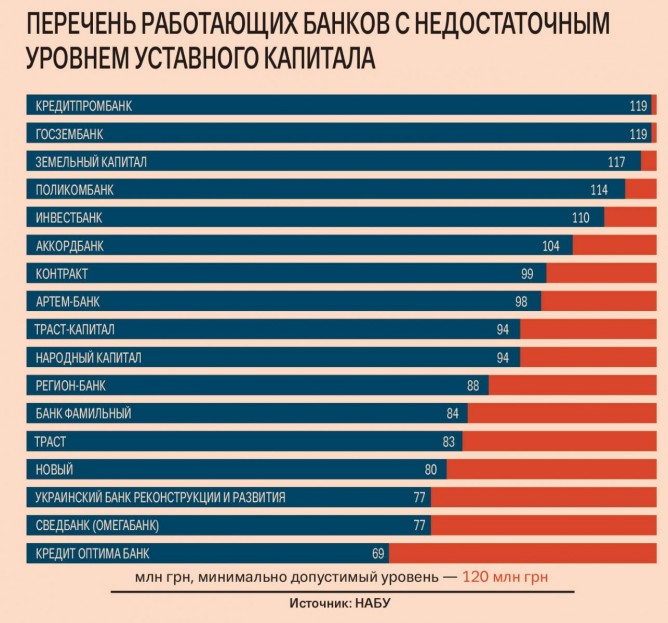Finance
sharesCommercial banks issued the maximum quantity of securities, but shareholders are reluctant to buy them

In October, the National Securities and Stock Exchange Commission (NSSEC) recorded the highest rate of share issue to the tune of UAH 108 bn. This is 60 times more than last month. “In January–October, the commission registered 126 issues of shares in the amount of UAH 119.43 bn, with the exception of Crimea and Sevastopol,” said Director of the Corporate Management and Corporate Finance Department at the NSSEC Alla Papaika. “This is almost three and a half times more than over the same period in 2013”.
Full speed ahead
Financial institutions issued most of the shares. Today, the banking system faces the issue of increasing authorized capital. The largest amounts of securities for recapitalization were issued by Delta Bank, Ukrsotsbank, Ukrainian Innovation Bank, National Credit, Kredyt Dnipro, Prime Bank, Alyans Bank, BM Bank, Platinum Bank, Piraeus Bank, Diamantbank, Privat, Finance Initiative, Ukreximbank, VTB Bank, Kontrakt and Oshchadbank, reported the NSSEC.
“The growth of emissions is associated with the need to increase authorized capital in order to bring into compliance the adequacy of regulatory capital,” says Chief of the Analytical Department at Art Capital Ihor Putylin. “In connection with devaluation of the hryvnia, the banks increased provisioning, which led to losses and reduction of their capital”. For example, as of October 1 the adequacy of regulatory capital of Delta Bank fell to 10%, while the required minimum is 10%. In summer, this index also came close to 11% at the Uktsotsbank.
Medium and small size financial institutions were also involved in dynamic issuance of stocks in addition to the largest financial institutions, which should complete the process of recapitalization by January 1, 2015, according to NBU Governor Valeria Hontareva. “Despite the fact that the NBU has not set deadlines for recapitalization of small banks, a detailed analysis of their activities is currently being conducted. Depositors withdrew their money from small banks, which resulted in a shortage of liquidity of banks,” said Chief of the Department of Financial Ratings at IBI-Rating Anna Apostolova.
Due to the increase of the number of insolvent banks, most major financial institutions closed interbank limits for counter-parties from the third and the fourth groups, thereby limiting their access to the interbank as a source of attraction of liquid funds. But while the major banks are able to cover the shortage through refinancing from the NBU, small banks have no such chance. The regulator has opened credit limits for only 88 banks. “For small financial institutions it is also difficult to get money from the NBU. The regulator is focused on support of banks with significant market shares. Not being able to replace the outflow of resources on the interbank market at the expense of refinancing, small banks have to apply for financial support to their owners,” explained Apostolova.
Saving lives
For example, the National Credit bank issued shares in the amount of UAH 244 mn, according to the website of the Agency for Development of the Stock Market Infrastructure. At the same time, the NBU Bank closed the credit limit for this financial institution. Representatives of the NBU rationalized this with the lack of money on the bank’s correspondent account, in which there should be at least UAH 100 mn, said Chairman of the Supervisory Board of National Credit Andriy Onistrat. The bank cannot get refinancing also because it does not want to buy T-bills. And on an automatic basis the NBU provides refinancing exclusively in exchange for government securities. Although National Credit issued shares in the amount of UAH 244 mn, it managed to sell only UAH 36 mn worth of them. As a result, the authorized capital of National Credit increased by UAH 36 mn to UAH 208.3 mn and the adequacy index of the bank’s regulatory capital as of October 1 was 13.45%, while the regulator requires an index of at least 10%.
For 17 small banks the issue of capitalization is very serious – their authorized capital is lower than the required UAH 120 mn. For example, the authorized capital of the Kontrakt bank is only UAH 86 mn. In September, the bank has already issued shares in the amount of UAH 128 mn, but so far no one has bought them and the registered capital of the financial institution is still below the required minimum. At the same time, the adequacy index of the bank’s regulatory capital of the bank is marginal – 10.06%.
The additional issue does not help all banks. For example, in May Prime Bank issued UAH 59 mn worth of shares, but no one had time to buy them. At the beginning of October, the Deposit Guarantee Fund introduced provisional administration in the institution. Furthermore the NBU accused the bank of money laundering.
Despite a significant increase in issuance of banks’ shares with a view to improving their financial situations, sometimes private owners have no available funds for this purpose. “A sad demonstration of the lack of funds for a capital increase is the story of insolvency of VAB Bank. A provisional administration was introduced in the bank on November 21, three days after its owner failed to hold a shareholders’ meeting scheduled for November 17, which had on its agenda the issue of increasing the bank’s authorized capital by UAH 7 bn,” said Chief of the Analytical Department at the Eavex Capital Investment Company Dmytro Churin.







 of the agreement of syndication with Financial Times Limited are strictly prohibited. Use of materials which refers to France-Presse, Reuters, Interfax-Ukraine, Ukrainian News, UNIAN agencies is strictly prohibited. Materials marked
of the agreement of syndication with Financial Times Limited are strictly prohibited. Use of materials which refers to France-Presse, Reuters, Interfax-Ukraine, Ukrainian News, UNIAN agencies is strictly prohibited. Materials marked  are published as advertisements.
are published as advertisements.